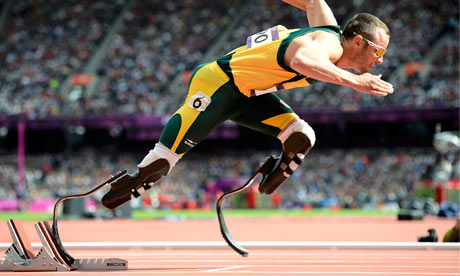The orgy of nationalism and sentimentality known as the Olympics has been very much not in my mind. The notoriously awful NBC coverage reduces excitement to boredom–they even showed ads during the middle distance races. There was a moment today, though, for those of us dis/abled or otherwise differently embodied folks, when Oscar Pistorius of South Africa ran in a 400 metres heat. As most people surely know, Pistorius is a double amputee and runs on J-blades. He not only participated but finished second, putting him in the semi-finals.
His charming pleasure in this accomplishment contrasted with the usual Gold! obsession of the Anglophone media. It reminds me that different modes of embodiment and body presentation continue to have to struggle for acceptance. One of the aspects of the Occupy movement that I love is its attachment and embrace of all forms of self-actualization. Pistorius’s lesson for us is that it’s not just an end to medical debt that we call for: we want everyone to be able to get what they need, whether that’s a signing school for the Deaf, gender reassignment surgery, prosthetics, insulin, whatever: regardless of income.
Pistorius has had to compete not only against his fellow athletes but the extraordinary assumption that running on prostheses might somehow be an advantage. The myth of the Terminator cyborg is perhaps to blame here. Vivian Sobchack long ago dismissed the enhancement fantasy from her own experience with a prosthetic limb. Pistorius himself put it like this:
I think often there’s a lot of debate about the advantages, but there’s not much said about the disadvantages. If this was such an amazing piece of equipment that’s been around for 14 years, then how come thousands of other Paralympic athletes aren’t breaking world records and challenging even a 45- or a 48- or a 49-second 400m?
Here then is the crux: in common with people of color, women and people of non-normative sexualities, the dis/abled are both assumed to be inferior but suspect for any effort that is made to make them/us equal. Pistorius cannot simply be a good runner who lacks lower limbs. He must be a “crippled” runner made into a superhero by his device.
I’m deaf, or technically hard-of-hearing because I can decipher sound using lip-reading and an electronic device. Being deaf is still assumed to be a personal failing by mainstream normative culture, who celebrate the occasional exception like the fabulous Marlee Matlin, but presume deafness to indicate stupidity as a rule.
Consequently, the 50 million people with hearing loss in this country are a totally ineffective lobby because we are unwilling to identify ourselves. Signing Deaf people, who defend Deaf culture vigorously, are the exception we should learn from.
For example, an odd editorial in the New York Times presented hard-of-hearing people yesterday as being at a disadvantage in noisy spaces because their devices amplify all noise, making it unbearably loud. This was true for analog hearing aids, but digital devices all use a compression curve and most that cost as much those the article cited (about $3000) will have a setting for noisy spaces that eliminates background noise. So I find myself at an advantage compared to my “hearing” middle-aged friends in such spaces.
The issue here is in fact one of insurance. If you have good insurance, as I do through New York State (thanks to my partner Kathleen), devices are covered. If not, you have to pay for them, and for hearing tests, and they are very expensive. So although hearing is considered the indispensable attribute of the human, because of music and spoken language, hearing aids are part only of what is known sneeringly as “Cadillac” plans. All politicians now agree such luxuries must be dispensed with. Prosthetic devices like those used by Pistorius and myself will be for those who can afford them. Some have disparaged Occupy as being “medieval” but what could be more medieval than that? Free universal health care is not a demand. It’s a right.


